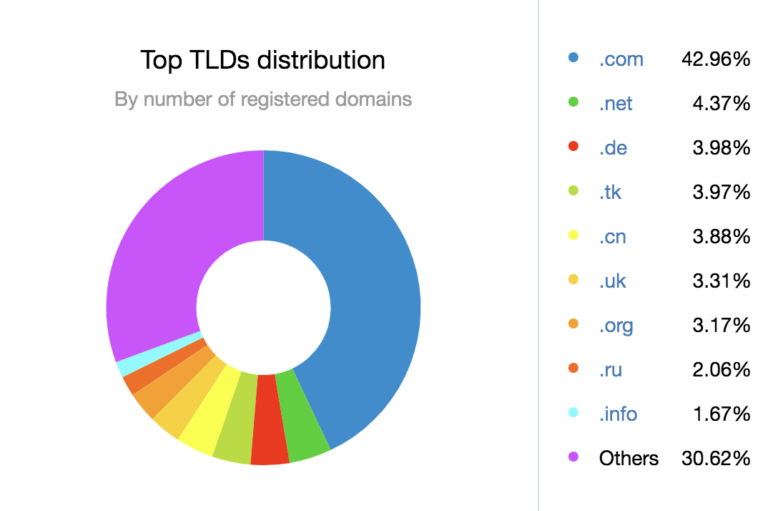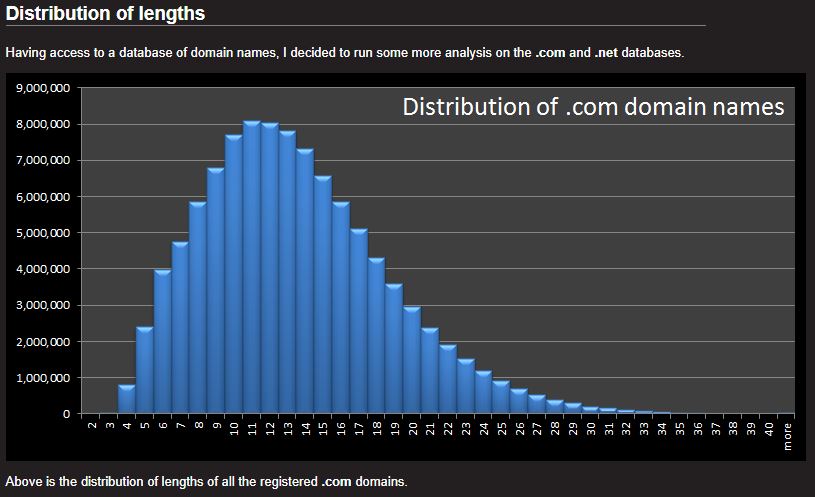
How thoroughly should you think about your domain name? Is it really that important?
If you have a quality website and business, people will visit your site no matter what the domain is, right?
Well, not so fast…
You see, your domain name is the key element of your website. It can make or break you, so it’s crucial to choose a domain name that works for your business.
But wait, why is your domain name so important?
- It’s your “first impression”. Your URL is the first thing your visitors will see. A good domain name can make a positive and lasting impression, while a bad domain name can send visitors running.
- It affects SEO. While exact match domains (EMDs) are no longer a necessity, keywords in your domain name can still help your SEO ranking.
- It defines your brand. We’ll talk about this in a minute – your domain name is a branding opportunity! The right domain name can increase brand recognition.
These elements are only a few of the many reasons why your domain name is so important.
How do you choose the right domain name? That’s precisely what I’m going to share with you today.
Important factors of choosing a domain name:
- Use .com, .org or .net (most popular ones)
- Brandable over generic
- Shorter is better
- Easy to type
- Easy to pronounce
- Avoid hyphens and numbers
- Consider using a keyword that reflects your website
- Think long-term over short term
- Check if it’s not trademarked
- Use domain name generators when stuck
How to Choose the Perfect Domain Name
1. Use The Right Domain Name Extensions (.com, .org, .net)

Source: revel.host
When you choose your domain name extension, you can be sure of one thing: “.com” is still the best.
According to research from DomainNameStat, 43% of all domains have the “.com” extension.
Why? Well, “.com” is the most familiar and easiest to remember.
While there are many successful websites with a “.net” and “.org”, your website will probably do better if it has a “.com” extension. It’s the safest bet.
My advice: Go with .com. If that’s taken, try .net or .org. If these are taken too, you’d be better off brainstorming a new domain name. And oh! – Avoid those weird extensions like “.club”, “.space”, “.pizza” and so on.
2. Brandable Over Generic
Creative and brandable are always better than generic.
Remember: Your domain name is how visitors will find, remember, and share your company on the web. It is the foundation of your brand.
Here’s the main difference between a brandable and generic domain name:
A brandable domain name is unique and stands out from the competition, while a generic domain name is usually stuffed with keywords and unmemorable.
For example, do you know the difference between Healthinsurance.net, Newhealthinsurance.com, or Healthinsurancesort.com? Probably not, right?
These are horribly generic. They don’t have any meaning. You won’t hear anyone talking about how awesome “Insurance.com” is. Variations of the word “insurance” will increase the competition and make it blend in even more.
Sites like UnitedHealthCareOnline.com and Anthem.com stand out because they stand for something. When people hear those domain names, there is a trust factor there.
Here’s how to find a more brandable domain name:
- Create new words. You can make up your own catchy, new words. That’s what Google, Bing, and Yahoo did.
- Use existing words. You can use a thesaurus to find interesting words that fit your brand.
- Use domain name generators. These tools can help you create a unique, brandable domain name from your initial domain ideas and keywords. (We’ll highlight some of our favorite domain name generators later in this post.)
3. Short Is Better Than Long

Source: datagenetics.com
In general, when it comes to the length of your domain, shorter is better.
According to research from DataGenetics.com, a blog by Nick Berry, the most common name length is approximately 12 characters.
(Popularity, in this case, refers to the amount of web traffic the site receives.)
All of this data shows that you should keep your domain name concise.
Aim for 6-14 characters – and remember the shorter, the better. Most likely the shorter domain names are taken a LONG time ago and sold for thousands of dollars. If you can’t find something short, make it brandable.
My own site – websitesetup.org is exactly 12 characters.
4. Make Sure It’s Easy To Type
Think of some of the most popular websites in the world. What comes to mind?
Google, Facebook, Twitter, Instagram, Yahoo, CNN…
One big thing they have in common is that they’re all easy to spell.
Your visitors should be able to type your domain name without a problem. If you have to explain the spelling more than once for it to be understood, it’s too complicated!
The last thing you want is for the potential visitors to mistype your domain and end up on a different website!
Here’s an easy way to test this…
Tell 10 people your potential domain name and ask them to spell it. If more than a few people struggle to spell it, you need to simplify it.
5. Make Sure It’s Easy To Pronounce
As easily as your domain name rolls off the tips of your fingers, it should roll off the tip of your tongue.
This makes it easier for visitors to share your domain name by word-of-mouth and makes it easier for you to share your site with friends and potential customers.
You can test this the same way as with the “spelling”.
Write your domain name on a piece of paper and ask 10 people to pronounce it. If more than a few people struggle to pronounce it, you should simplify it.
Here’s what to keep in mind: You want your domain name to be passed along easily by you and others. The only way for that to be possible is if it’s 1) easy to spell and 2) easy to pronounce.
6. Avoid Hyphens And Numbers
Remember how your domain name should be easy to spell and pronounce? Hyphens and numbers make it more difficult.
Imagine explaining Facebook if it had a hyphen in there…
“Have you seen this new site Face-Book? There’s a hyphen in there by the way, between the ‘Face’ and the ‘Book.’”
Facebook might not have spread so quickly if that was the case.
The bottom line? Your domain name should be smooth and punchy – hyphens and numbers get in the way of that.
Stick to the letters!
7. Consider Using “Niche” Keywords That Reflect Your Website
Our website mainly about web development or helping people to create a website. Hence we chose to add a name that reflects all of it – “website”. Obviously website.com (or .org, .net) was no longer available, we simply chose “WebsiteSetup”.
Keywords can help to improve your SEO – you need to tread carefully here! If you try to awkwardly stuff keywords into your domain, it comes across as generic (like we talked about before).
If you choose to use keywords, put the keywords at the beginning of your domain. That’s where they’ll be the most powerful for your ranking.
You can find keywords with tools like Google Keyword Planner and Keywordtool.io.
8. Think Long-Term Over Short-Term
Are you ready to marry your domain? You should be because it will be one of the biggest elements that define your business and brand for years.
If you decide to change the domain in the future, it will cost you money, branding, and SEO rankings. In short – it’s a huge pain!
When you’re choosing your domain, think long-term.
For example, if your company helps businesses optimize their websites for SEO, you could choose a domain name like, “OptimizedSEO.com”
If you think there’s a chance you might expand to more general digital marketing services in the future, like email marketing, PPC, etc. then it might be wise to reconsider your domain name.
You don’t want to pin yourself down to a certain niche if you think you might expand out of that niche.
Therefore, keep your long-term vision in mind when picking your domain name.
9. Check If It’s Not Trademarked Or Already Used
Before you move forward with a specific domain name, check to see if the name is available on social media sites, as well as if there are any trademarks already registered to the name.
You can check current trademarks here: https://trademarks.justia.com/
To build your brand, it’s ideal to have the same name across your domain and social networks. This builds familiarity and makes it easy for your visitors, fans, and customers to find you around the web.
Avoid legal issues; you should stay away from names that already have trademarks.
How can you quickly check social networks and trademarks for your potential domain name?
It’s quite easy with a tool like Knowem. Search your potential domain name – it’ll show you if it’s available throughout over 25 popular social networks and if there are any trademarks already registered to the name.
If it’s taken, consider tweaking it so that you can create original social media profiles.
10. Use Domain Name Generators When Stuck
At this point, you should have at least a general idea of some possible words to put in your domain. Some of those words may already be taken, trademarked, or just don’t have the “sound” you’re looking for.
That’s where domain name generators come into play. These generators can turn your ideas into fresh, available domains.
Here are some of our favorite domain name generators to try out:
- Revel.Host. This tool allows you to plug in a word; it will come up with ideas that either contain that word, begin with that word or end with that word.
- Lean Domain Search. This tool matches your keyword with other keywords and generates a list of available domains.
- DomainHole. This tool allows you to search keywords, find expired domains, generate new names, and more.
